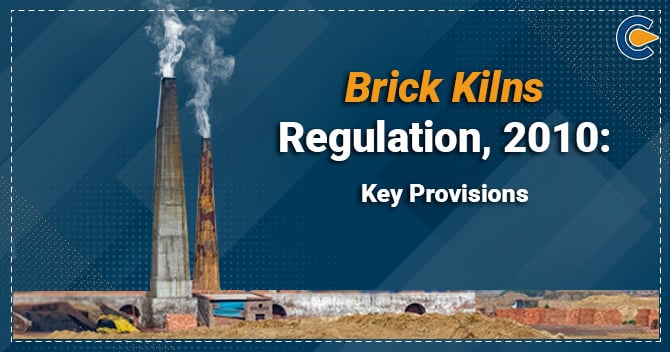In Indian architecture, Bricks are treated as traditional building materials which hold a lot of importance. In India and some regions of the world, Brick Manufacturers still use the traditional firing technique. After China, India is the second-largest bricks manufacturer, producing over 10 per cent of the global production, and has about 140,000 brick-making undertakings, accounting for 250 billion brick masonry units. In developed nations, the Brick kilns have been replaced by continuous tunnel kilns that produce millions of high-quality bricks in less time. In this article, we will discuss Brick Kiln and Brick Kilns Regulation, 2010.
What is a Brick Kiln?
In traditional kilns, Bricks are handmade and transported by horses, mules, donkeys, etc. They transport many tonnes of bricks each day in carts or packs within the kilns and to other locations for construction. Because of the same practice, Injuries and diseases were caused by extreme temperatures, lack of shade, water, rest, difficult terrain and overloading. Bricks are manufactured in brick Kilns that emit harmful gases, affecting humans, the environment, and the economy.
An Overview on the Brick Kilns Regulation, 2010
Brick Kilns regulation is an act to regulate and control the establishment of Brick Kilns in the respective State. This Act could be referred to as “the Jammu and Kashmir Brick Kilns (Regulation) Act, 2010.
Establishment of a Brick kilns Regulation, 2010
Brick kilns shall be set up on any land other than-
(a) Agricultural land,
(b) A land fit for cultivation of any agricultural produce,
(c) A land not been declared as Banjri-Kadim in the Revenue records, or
(d) A land within the demarcated forest area of the State under the Jammu and Kashmir Forest Act, 1987.
Appointment of Licensing Authority
The Government may appoint the below-mentioned officers by issuing a notification in the Government Gazette,
(a) Officers of the Government as it thinks fit to be the licensing authorities for this Act, and
(b) Brief the limits within which such authority shall exercise the powers conferred on a licensing authority by or under this Act.
Grant of a License under Brick Kiln Regulation 2010
- Anyone who wishes to set up the brick kiln in an area in the State, following the guidelines laid out in section 4, shall apply in writing to the licensing authorities in the region for granting permission to establish the brick kiln to begin manufacturing bricks on it.
- Anyone who owns a kiln in disuse who wishes to resume the brick manufacturing process must make an identical application before the licensing authorities in the location to grant a license to resume the brick manufacturing process within the kiln.
- The owner of an existing kiln must, within 30 days of the date of inception of the Act, make an application with the licensing authorities in the region for the granting of a license for the continuation of manufacturing bricks in the kiln.
- Each application under subsections (1) and (2) must be in the prescribed format. It shall include details about the brick kiln’s location, size and type, and other required information.
Restrictions on the establishment under Brick Kilns Regulation Act, 2010
After the commencement of Brick kiln Regulation 2010-
- No individual may build a new brick kiln without obtaining a license under or following this Act.
- No brick kiln owner may continue brick manufacturing operations without a license.
- No owner of a brick kiln-
(a) After the expiration of the license, no brick manufacturer shall be allowed to operate in a brick kiln owned by someone who has received a license under section 6,
(b) The License for a brick kiln is revoked or suspended according to section 10. Brick manufacturing operations cannot be carried out in the brick kiln by the owner after the revocation or during the suspension period,
(c) The License for a brick kiln is revoked or suspended according to section 10. Brick manufacturing operations cannot be carried out in the brick kiln by the owner after the revocation or during the suspension period,
(d) The brick kiln owner must obtain permission from the licensing authority before expanding the brick kiln.
Note: If the application for a License is pending approval before the licensing authorities, the validity period of a license shall not be considered expired for clause (a).
No person shall set up a brick kiln or apply for renewal unless a person-
- Generates transfer of land use rights certificate from Revenue Department,
- Get an environment clearance certificate from the Department of Environment and Remote Sensing,
- It has enough mud to serve as a raw material for the brick kiln, and it is located on insufficiently balanced, non-productive land. To establish the same, the approval of the Director of Agriculture is required.
Documents requirement under the Brick Kiln Regulation, 2010 –
Below mentioned documents must be attached to every application-–
- A site map and a Revenue report and affixed by the respective Tehsildar to indicate the title, location, status, and kind of land-
- NOC from
- Deputy Commissioner.
- SPCB (State Pollution Control Board)
- Divisional Forest Officer concerned
- Wildlife Warden concerned
- Director, Geology, and Mining
- District Agriculture Officer concerned
- Block Medical Officer concerned
- Tehsil Education Officer concerned
- The respective Executive Engineer (PWD/R&B) concerned, and
- Tehsildar is concerned.
Validity of License
The license granted in these provisions is valid for two years from the date of its issue. It can be renewed for two years consecutively, provided that it is accompanied by the royalty Clearance Certificate from the Geology & Mining Department. Also, the licensing authority will choose the kiln that is no longer in use over the building of brand-new brick kilns if it complies with the standards set forth within the Act and the Rules made under it.
Any person who has the authorization to operate the brick kiln has been issued and wishes to apply for brick kiln registration with the Industries and Commerce Department before creating the brick kiln.
Fee for a license
The fee for granting a license is thirty thousand rupees, and the annual renewal fee for this license shall be Rs ten thousand. However, by notification in the Government Gazette, the Government may revise the license fee and renewal fee. The licensing authority must forward a copy to each department after the license has been granted-
- Industries and Commerce Department,
- Consumer Affairs and Public Distribution Department,
- Commercial Taxes Department,
- Geology and Mining Department,
- District Development Commissioner; and
- Pollution Control Board .
Protection of the environment
Anyone who holds a Brick Kiln license shall abide by the laws governing pollution. They must make every effort to take the measures and put those devices required to protect the environment and reduce pollution as determined by the authority in charge. Dust pollution from exhaust fumes is controlled and kept within permissible limits under the laws applicable to them in time.
Revocation or suspension of license under Brick Kilns Regulations Act, 2010
In case that the authority was of the view that, based on a reference made in this manner or in any other way that, ––
- A license issued under section 6 was obtained by false reporting of the essential facts; or
- The License holder has, without just reason, has not complied with the conditions to which the license was granted; or
- The License holder has ceased the manufacturing or production of bricks without any rational thought to create artificial scarcity.
- The License holder violated any of the requirements of the Act and the regulations formulated under it.
- The holder of a license is convicted and prosecuted according to section 21 of the Act in that case. Without prejudicing any other penalties for which the holder of the license may be held accountable under this Act, the licensing authority could, after having given the person who holds the license the opportunity to present a reason or revocation, suspend or revoke the license, or even forfeit the amount that it is, if there is it is any or a portion of it deposited as security to ensure the proper fulfillment of the conditions to which the license was granted.
Note-The licensing authority may also identify the brick kiln owner and prohibit him from issuing the license for not exceeding ten years.
Payment of royalty under Brick Kilns Regulation Act,2010
Any kiln proprietor licensed can take and consume the clay used to create bricks after obtaining a valid license upon paying such royalty as prescribed by the Geology and Mining Department, subject to revision for two years. Failure to pay royalty will render the licensee responsible for the recovery of royalty, fines, penalties, or even the annulment of the license by the appropriate authority.
Power of inspection
Any person authorized by the Government shall have authorization;
- To enter and inspect any brick kilns
- To seize order production of any document, book, or register that has the owner or the controller of any brick kiln or any employee has prepared. The authority shall inspect when he believes an infraction or violation of the Act or its regulations is currently being committed.
- To stop Any vehicle or cart carrying bricks for sale, storage, supply, or other purposes; and
- To seize bricks from any person, vehicle, or cart if he believes that there has been, is being, or will be a violation of the Act or its rules.
Fixation of price under Brick Kilns Regulation, 2010
Through a notification via the Government Gazette, the Government could periodically fix the maximum brick price for the entire State or specific areas of the State. Different prices can be established for various bricks based on their weight and size, the strength of all bricks, and the ratio between quarter (broken) bricks for every thousand.
Quality of Bricks under Brick Kilns Regulation, 2010
The bricks made by the licensed owner of the kiln will conform to the requirements established for the product in the Indian Bureau of Standards or any other authority authorized to do so, and any deviations will constitute an offence by section 21 of the Act.
Delegation of powers under Brick Kilns Regulation, 2010
The Government may, through an announcement published in the Government Gazette, direct that the powers conferred by it under section 13 subject to the conditions or limitations as are specified in the directions, be exercised as well by any official or authority that is who is subordinate to it as is specified in the notification.
What are the Appeals and Penalties under Brick Kilns Regulation Act, 2010?
Appeal
- Anyone who is dissatisfied by a ruling of the licensing authority could, in 30 days following the day on which the judgement is made known to him, decide to appeal to an Appellate Authority as may be designated by the Government in this regard; provided it is noted that Appellate Authority may entertain the appeal after the thirty days, but not later than sixty days after it finds of the fact that an appellant is prevented due to enough reason not to file the appeal within the time frame.
- When it receives any appeal made under subsection (1), an Appellate Authority shall, after allowing the appellant to be heard, decide on the matter as quickly as it is feasible.
Penalties
- Someone violates any of the rules in this Act and the regulations enacted under it. In that case, he/she will be punished with imprisonment for a period that may be extended to two years or with a fine that could be up to fifty thousand rupees or both.
- The person who is punishable under subsection (1) includes a corporation or another corporate body; each Director, Manager, Secretary, Officer, or Agent will unless he can demonstrate that the contravention occurred without his knowledge. He took all the necessary precautions to stop the infringement and be found guilty of the violation
Power to exempt under Brick Kilns Regulation Act, 2010
By special or general order or special order, the Government can exclude any particular area from the effect of all or any provisions under the Act. It may also amend, vary, or cancel any of these orders.
Protection of action taken under Brick Kilns Regulation Act, 2010
A lawsuit, prosecution, or legal action will be brought against any officer or authority for any action done with good faith or planned to be carried out according to the Act and any other rule or decision made under it. Any suit or legal actions shall be brought on behalf of the Government for any loss caused or likely to cause due to anything done in good faith or is intended to be carried out under this Act and any other rule or order issued under it.
Takeaway
Brick Kins Regulation Act, 2010 helps in controlling the establishment of Brick Kilns in the respective State. The Government often gives directions to the Licensing Authority for carrying out the purposes of this Act.
Read our Article:How To Set Up A Brick Manufacturing Factory In India?













